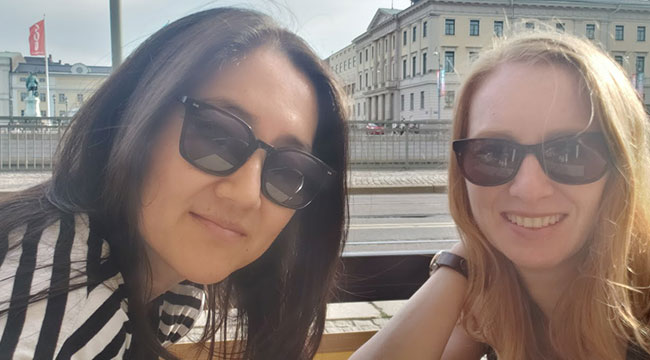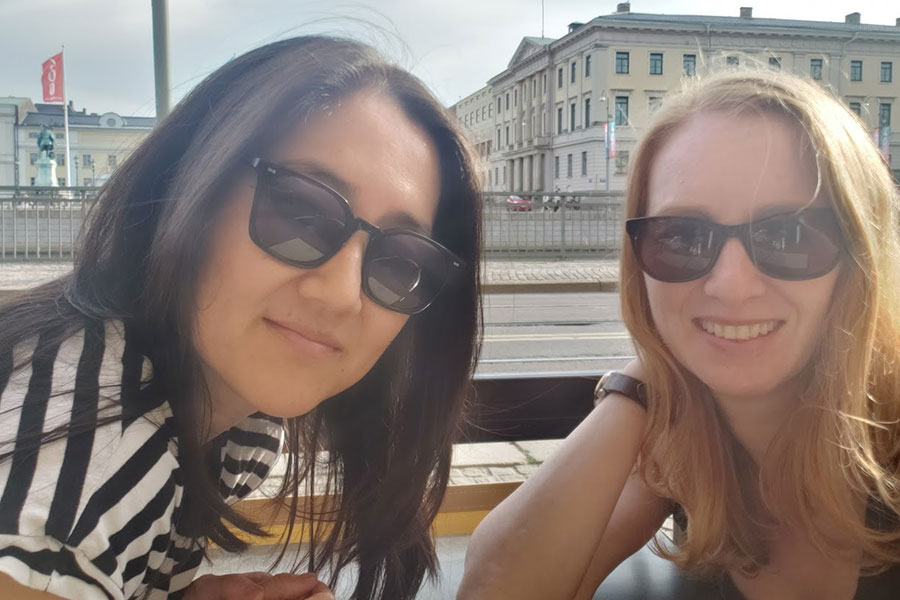Canadian Blood Services social scientists attend ISBT 2023

In this blog, Canadian Blood Services scientists Dr. Jennie Haw and Dr. Kelly Holloway reflect on their experiences presenting at the International Society of Blood Transfusion (ISBT) annual conference in Gothenburg, Sweden. Read on to learn more about their social science research at this international event!
At Canadian Blood Services, we are part of the Donation Policy and Studies team led by medical director of donor and clinical services, Dr. Mindy Goldman. As social scientists working in the transfusion medicine field, we study the behaviours of donors and nondonors, as well as the social dynamics of the different people who make up blood systems, including staff, recipients, clinicians, and policymakers.
We call this small but growing field of research donation studies and are fortunate to be a part of several initiatives that seek to build connections and scholarship in this area. These include the Donor Research Network (DoRN), a global network of interdisciplinary researchers and practitioners, as well as the British Sociological Association’s Deconstructing Donation study group and are also working to establish a network of scholars in donation studies through the Canadian Sociological Association. The ISBT Congress was an opportunity to bring together social scientists who primarily work with and within blood operators to continue to create a meaningful and applied donation studies field.
1. What is the ISBT Congress and who does it typically include?
ISBT is an international scientific society that brings transfusion medicine professionals from over 100 countries together to share knowledge and improve safety of blood transfusion worldwide. The ISBT Congress typically includes researchers across the field of transfusion medicine, from laboratory medicine and pathology, clinical transfusion and immunology, epidemiology and surveillance, and supply chain. Attendees engage in the latest research about the safety, efficacy and distribution of blood products.
2. What is social science and how is it relevant to transfusion medicine and Canadian Blood Services?
Without donors, we have no blood products. As our social world changes, the donor base does as well. Issues like climate change, systemic discrimination, and access to healthcare inform the contexts that current and future donors live within. Those social issues affect the demographics of our respective nations, and the extent to which the public invests in the blood service as a trustworthy and necessary entity.
As blood services internationally strive to bring in new generations of donors, social scientists tackle challenging questions, such as how to communicate sexual risk-based behaviour screening, and how to work with racialized communities to build a blood service focused on equity and diversity.
“By recognizing the social context of donation and attending to the values, perceptions and practices of donors and the public, we aim to build a thriving blood service that can meet the needs of every recipient.”
3. Why did you want to participate in ISBT?
When Canadian Blood Services senior scientist Dr. Jason Acker was appointed as ISBT’s Scientific Secretary in 2022, we saw an opportunity to speak to our colleague about building more of a presence for social sciences at ISBT. Dr. Acker was immediately supportive and worked with us to develop a plenary session featuring some of the key social scientists in the field of donation studies in the ISBT 2023 Congress scientific program. We wanted to participate in ISBT because we often feel we are between worlds. In the field of sociology, donation studies is still growing as a research area and has very little applied research that specifically addresses the needs and concerns of blood services.
“In the field of transfusion medicine, social science, and specifically qualitative methods are not well understood as a field of scientific study. Thus, we are creating space for our work by translating our aims, methodologies, scientific findings and scholarship to an audience that, like us, is devoted to ensuring that patients have access to safe, high-quality blood products.”
4. What was a highlight for you at ISBT 2023?
A key highlight of the conference was the social science plenary session. Talks were given by Dr. Eva-Maria Merz (Netherlands) and Dr. Eamonn Ferguson (UK), two social scientists who are leading some exciting projects in the field of donation studies. In presenting an overview of their research programs and projects spanning several years, both speakers highlighted the importance of understanding donation as being embedded within the broader sociocultural context and of applying theory and methodological rigour to this field of study. We were reminded that addressing current day challenges of increasing donors from under-presented racialized communities and understanding the impacts of COVID-19 on donor behaviour requires focused study but also builds on research that has been done. The more robust the field of donation studies, the better positioned we will be to address current and upcoming challenges in donation.
A second highlight was being able to meet other social scientists in person at the conference. We had met several virtually over the past couple years but having the opportunity to talk and share ideas over food and drinks was invaluable.

5. What did you present at ISBT?
I (Kelly Holloway) presented a poster on my work about the impact of plasma donation. This qualitative study with colleagues at the University of Toronto is funded by Canadian Blood Services and Social Sciences and Humanities Research Council (SSHRC) and investigates how recipients of immunoglobulin –a therapeutic made from the plasma contained in blood that is also commonly referred to as “Ig”– understand and experience this treatment to tell the story of how plasma impacts a recipient’s life. The poster shared results from 43 narrative interviews with 23 recipients of immunoglobulin and concluded that immunoglobulin has a significant impact on the life of the recipient. Results also found that recipients of Ig struggle to receive a diagnosis, obtain reliable information about their condition, and the treatment, and find support for managing illness. Addressing these systemic issues in the healthcare system could allow recipients to access a community that can support them and raise awareness about the impact of plasma products.
- Read more about Dr. Holloway’s studies in this open access research article, Understanding the experiences of plasma donors in Canada’s new source plasma collection centres during COVID-19: A qualitative study, as well as these previous R.E.D. blog posts:
I (Jennie Haw) gave an oral presentation in the session, Change management – Evidence-based decisions, which shared study results to inform blood operators on moving to more inclusive gender options for trans, nonbinary, Two-Spirit, and other gender-diverse donors. I presented results from two studies that were funded by the MSM Plasma Program: one focused on current donors’ views on, and understandings of, a two-step question that could be used during the screening process before a donation (that is, asking donors their gender and sex assigned to them at birth); and one focused on the views of trans, nonbinary, Two-Spirit, and other gender-diverse donors on providing more inclusive gender options when registering donors, including the option of a two-step question.
- Read more about Dr. Haw’s studies in these recent, open access research articles:
6. What did you learn at ISBT?
In addition to learning from the many scientific presentations, we gained a deep appreciation for the leadership and productivity of Canadian Blood Services’ clinicians and scientists on an international stage. They presented in Academy Day sessions (held the day before the scientific program with a focus on research and education), in the Scientific program, led discussions, and are members and leaders on various working groups at ISBT. Seeing their active contributions was inspiring.
We also benefited from gaining an international perspective on the areas of focus for scientists and blood operators around the world. Through this broader perspective, we were able to see how professionals and researchers working on different components of the blood system view donors and donation, allowing us to think more deeply about our work and how to translate what we do to an international transfusion medicine audience. We really appreciated learning and hearing from others in low, medium, and high-income countries at this event.
7. Do you have any thoughts on future opportunities at ISBT?
We have lots of ideas to further build the social sciences into the program at ISBT, starting with increasing social science presentations in the scientific program. This can be accomplished through dedicated sessions on the social science of donation or donation studies. We could support this by increasing awareness of ISBT among our networks and encouraging them to submit abstracts. Next, we envision opportunities to provide educational content on social science theories and methodologies during the Academy Day by inviting social scientists to present about their work in the field of donation studies. And lastly, increasing opportunities for formal and informal networking for social scientists at ISBT could be an exciting way to leverage the strengths of the in-person conference, creating space to meet new people and share ideas!
Canadian Blood Services – Driving world-class innovation
Through discovery, development and applied research, Canadian Blood Services drives world-class innovation in blood transfusion, cellular therapy and transplantation—bringing clarity and insight to an increasingly complex healthcare future. Our dedicated research team and extended network of partners engage in exploratory and applied research to create new knowledge, inform and enhance best practices, contribute to the development of new services and technologies, and build capacity through training and collaboration. Find out more about our research impact.
The opinions reflected in this post are those of the author and do not necessarily reflect the opinions of Canadian Blood Services nor do they reflect the views of Health Canada or any other funding agency.